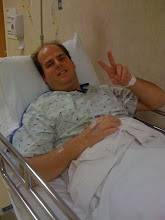Thursday, April 8, 2010
Shockras
In a week I will have my next appointment in the neuroscience wing. In the meantime (this is a vacation week with the orchestra) we are keeping the stress level down by catching up on episodes of the TV show “24”. We just saw one where Jack Bauer (the protagonist) hung from the ceiling with bound wrists while the Russian mafia attached live jumper cables to his wounds.
“There,” I said to MJ. “That’s what it feels like, only on my brain.”
Noah noticed my voice and tipped his head to see if I had a treat. I didn’t, so he slumped back, groaned and watched the screen as Jack Bauer took more juice.
I was exaggerating, but only a bit. The new medication (Trileptal) doesn’t help (at least at the current dosage), but I am supposed to continue it until the next appointment. I don't know yet whether this is some form of epilepsy, but I have recently read that over 5% of craniopharyngioma patients (in one study) are later diagnosed with epilepsy. This is much higher than the national average.
I still experience the brain shocks—I now call them "shockras"—but I try to avoid situations where they occur. This means I never rest during the day, not even for a moment. And by “rest” I mean the moment I relax my thoughts, stopping to consider something beautiful, stopping to “smell the roses” if you will, stopping to think how something reminds me of the time when … KZZAAAAAPPP!
Like that.
As a result, I am sleep-deprived, probably more susceptible to interrogation than if I were drugged with Sodium Pentothal. I would reveal everything. Bank account numbers. Phone numbers. Safe combinations. The location of the rebel base. I’ll talk, but just STOP THE SHOCKS!
Again, I exaggerate, but only a bit. I do not suffer 24 hours a day. I suffer for one second, anywhere from three to fifteen times a day. And then I’m not suffering.
Imagine someone holding a sharp object over your hand. There is no pain yet, but you know at some point during the day that person will stab you with the sharp object quickly. Then—just as quickly—the pain will disappear.
So what do you do in this predicament? Yes, you see the right doctors and try different medications. But, besides that, what do you do? You go about your day.
Wake up. Nothing.
MJ makes breakfast. Mmm, good coffee. Good eggs. Good toast. Nothing.
Go for a walk outside. Cool spring air. Beautiful. Nothing.
Compose a little, write a little, check your email. Nothing.
Lunch? Sounds good. Good soup, mmm. Nothing.
Phone call. Nothing.
Errand. Nothing.
Dog walk. Nothing.
Fold laundry. Nothing.
Book. AAARRRRRRRGH.
Recover.
Book. Nothing.
Like that.
I can’t wait to see what the EEG will show. If it records one of these shocks it might break the machine.
Subscribe to:
Post Comments (Atom)





My 28 year old daughter recently had surgery. She also has a craniopharyngioma. Darn things. We'd both love to trade war stories with you!
ReplyDeleteDonna
Donna, please email me privately at -
ReplyDeletealedude@comcast.net
I would love to trade stories with both of you too. There aren't many of us out there!